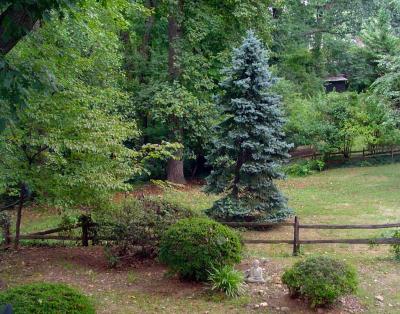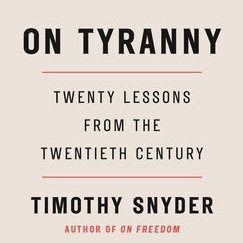
My writing room is on the second floor of our house in Arlington, Virginia. Sometimes I write on a computer located in a double-wide closet where I have a built-in desk and bookshelves. At other times I write at a desk overlooking our back yard; from there I see a small stone Buddha, a split rail fence between us and the neighbor, and a swath of trees that descends along Donaldson Run across Military Road to the Potomac River a mile from here.
My desk is surrounded by overstuffed bookcases, a leather chair, some dumbbells, and a few things on the wall, notably a print of Andrew Wyeth’s “Evening at Kuerners,” a somber image straight out of my Pennsylvania childhood, which is why I value it so much. I’ve written two novels, a book of nonfiction and dozens of short stories in this room during the last thirteen years, longer than I’ve written in any other room. I come here first thing in the morning and work until mid-day, then I work out at the gym, and come back and work some more. When I’m writing, I don’t know I’m here. I begin by simply beginning, six or seven days a week, and I end as a natural ending point in what I’m writing presents itself, both on the page and within me. I’ve led an unusual life –I spent 25 years as a diplomat and wandered a lot before that — so I’ve had writing rooms in Charlottesville, Virginia; Baltimore, Maryland; Corrales, New Mexico; Mexico City, Mexico; Madrid, Spain; Bonn, Germany; and many other places, over 30 in fact.
The worst writing room I ever had was in Baghdad, where I was the U.S. ambassador’s senior advisor. I lived and wrote in a trailer that was tucked into a labyrinth of sandbags. When the wind blew, it drove sand through the air conditioner onto my desk. I was probably the only person on the compound with a desk in my trailer, but that was one of two conditions I imposed before agreeing to go to Baghdad: I had to live in a trailer by myself (no roommates) and I had to have a desk so I could push on with my own work at night. Nonetheless, miserable is a good word to describe how I felt living and writing in that trailer.
Things are different now. This room is molded by what I’ve written and what I’ve read. So I’m comfortable here. Sometimes our border collie walks in and out. Sometimes our white greyhound comes in and plopsdown. Usually not. Usually I’m alone and keep what I’m working on to myself until I’m finished with it.
This the quietest room in a quiet house, about as quiet as “Evening at Kuerners,” which depicts a typical Pennsylvania farmhouse halfway up a hillside with a stream below and a fringe of field and trees and some clouds above. There’s one light on in the farmhouse. Someone’s in there, presumably Karl Kuerner, Wyeth’s friend and eerie subject. But I don’t always know who’s in here. That’s why I come in every day: to find out.
Robert Earle is the author of two published novels, The Man Clothed in Linen and The Way Home, a novella, Thank you, No. We’re Well, dozens of short stories, a nonfiction book about a year he spent in Iraq, Nights in the Pink Motel, and a nonfiction book about North American interdependence, Identities in North America.
Photo by Robert Earle



